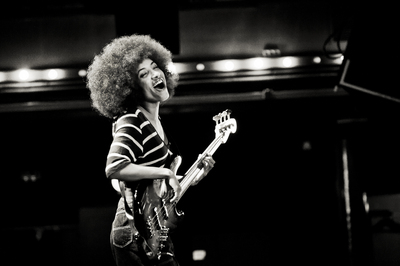Jazz star Esperanza Spalding making Summer Festival appearance at Power Center

Esperanza Spalding
Last year, Spalding—the young bassist, composer and singer—surprised many in the music industry when she won the Grammy Award for Best New Artist. That win defied the conventional wisdom that the award would go to Justin Bieber—since, let’s face it, the Grammys are often more about commercial success and mass appeal than they are about artistic achievement.
And Spalding became the first jazz musician to ever win the award—no small feat, again, given the nature of the Grammys.
And last month, Spalding released her new disc, “Radio Music Society,” which is a companion piece of sorts to the 2010 album, “Chamber Music Society,” which was the album that essentially won her the Best New Artist award. (“Chamber Music Society” also reached No. 1 on Billboard’s Contemporary Jazz chart.)
So, there was a big buzz of anticipation leading up to the release of “Radio Music Society." And she didn’t disappoint. “Radio Music” was her most ambitious and diverse record to date (it’s her 4th), winning across-the-board effusive reviews. It debuted at No. 10 on Billboard’s jazz chart and quickly rose to the No. 1 position.
PREVIEW
Esperanza Spalding
- Who: Young bassist, composer and singer who won a Grammy last year for Best New Artist.
- What: Heady mix of jazz, R&B, funk, pop, soul and hip-hop.
- Where: Power Center, 121 Fletcher St.
- When: Thursday, June 21, 8 p.m.
- How much: $30-$50. Tickets can be purchased by calling the Ticket Office at 734-764-2538; in person at the Michigan League Ticket Office, 911 N. University Ave; or online.
While “Chamber Music Society” was a supple synergy of jazz and classical music, “Radio Music” is a livelier hybrid of jazz, soul, pop, funk and R&B. For the sessions, she employed mostly jazz musicians, and some impressive ones at that, including three different all-star drummers in Jack DeJohnette, Terri Lyne Carrington and Billy Hart, plus acclaimed sax player / composer Joe Lovano and guitarists Jef Lee Johnson and Lionel Loueke. And backing vocalists include Leni Stern and Gretchen Parlato.
Spalding has likened the album to listening to the radio in your car, punching up different stations, and stumbling on a song that catches your ear, and then, when it’s over, moving on in search of another great tune, and discovering new music along the way.
"The benefit of the radio is, something beyond your realm of knowledge can surprise you, can enter your realm of knowledge," Spalding recently told National Public Radio. "Part of the premise of that stems from my concern about the accessibility of jazz, just how people can access it. If you don't already know about jazz music, how would you be exposed? How would get an opportunity to find out if it spoke to you? If you get exposed to it enough, you might find a taste for it."
She elaborated on that notion in an interview for the record-company press statement that accompanied the release of the album: “Everyone has the experience of turning on a car radio,” she said—“mindlessly flipping through the dial and suddenly a fragment grabs you and you’re totally digging it. I wanted to capture that moment when the music just sinks in. It’s about the power of song, and how at the least it can save the day.”
For most of the songs, Spalding recruited a film crew to shoot accompanying videos that are available as digital downloads to those who buy the album, or on a DVD that comes with the deluxe edition of the album. The videos were shot in various locations, including New York City, Barcelona and her hometown of Portland, Oregon.
One of the videos, which accompanies the song “Black Gold,” examines the subject of what African-American children are learning in school.
"What we learn in school, and what's often spoken about, is so heavily connected with slavery or overcoming oppression," she told NPR. "I just thought that there's also something to be said for our connection with pre-colonial African culture. It's just a little offering to that dialogue of our identity."
The music on “Radio Music Society” excels at combining and recombining different styles. In one instance, that might mean finding the intersection between neo-soul and jazz-pop. Elsewhere, like on the song “Crowned and Kissed,” the ace players combine a limber bassline, a swinging groove by Carrington—and the use of horns as a counterpoint - to achieve a crackling synergy of funk, soul, jazz and hip-hop.
In addition to Spalding’s originals, the disc includes two covers—“I Can’t Help It” (originally a Michael Jackson recording written by Stevie Wonder) and Wayne Shorter’s “Endangered Species,” which Spalding wrote lyrics for.
Lovano’s sax adds subtle melodicism to “I Can’t Help It,” and the arrangement of the Shorter song (which he originally released in 1985) tilts toward the jazz-rock fusion sound he’d pursued with Weather Report during their mid-to-late-‘70s period.
In a way, the fusion of various styles recall the 1970s, when radio was not so rigidly programmed, and where one was much more likely to hear a heady mix of styles on a single station—or in a single song.
“And sometimes people won’t like it,” Spalding said in a conference-call interview with journalists from around the country, back in March when the record was released. She was specifically referring to making such an eclectic album today, in a radio landscape dominated by such rigidity. “An album or a concert is a sharing of where an artist is at. But…all I can do is what I hear, feel or dream. So that’s what I do, you know?”
Kevin Ransom is a freelance journalist who covers music for AnnArbor.com. He can be reached at KevinRansom10@aol.com.


Comments
PersonX
Sun, Jun 17, 2012 : 2:18 a.m.
dull
Ross
Sat, Jun 16, 2012 : 8:04 p.m.
Can't wait for the concert. She is really something special!